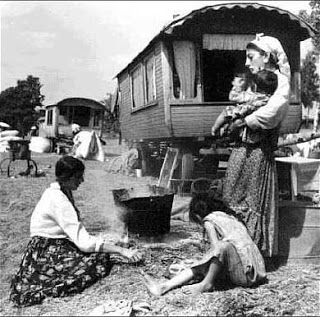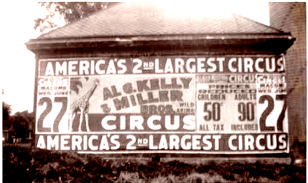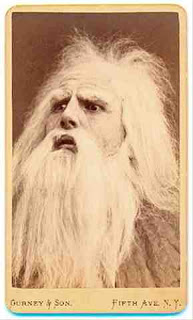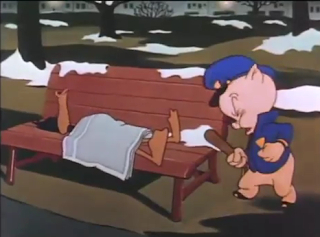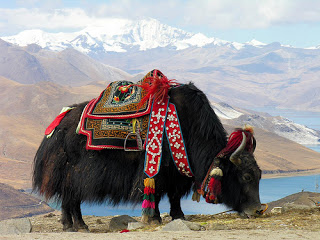Oddball Films presents Nomads in the Ozone: Gypsies, Hobos and Wandering Souls, a screening examining nomadic life around the world. From gypsies in Eastern Europe to traveling traders of Tibet to the legendary hobos and comedic vagabonds of North America, this genre-bending program explores global and pop collective concepts of nomadic life. Showcasing ethnographic films such as Tibetan Traders (1958) portraying the life of a semi-nomadic Himalayan tribe traveling through Tibet and India; documentaries like Circus Nomads (1975) capturing the colorful and hardship-laced culture of the traveling circus life; and the silent comedy of The Tramp(1915) featuring Charlie Chaplin’s fastidious hobo falling in love with a girl he rescued from robbers, this collection of esoteric films reflects on ephemerality and transience through time and space. Other highlights include: the novelty short Rip Van Winkle Returns (1953), showing the legendary vagabond as he attempts to adapt to modern 1950s life, the cartoon antics of policeman Porky Pig and a homeless Daffy Ducky inRiff Raffy Daffy (1948), the comedic duo of Abbott and Costello as train hopping, gambling hobos in Hollywood And Bust (1955), Nomads of the North (1950), Alaskan Inuit protect reindeer from killer wolves, and Desert Regions: Nomads and Traders (1980) showcasing the diverse yet similar nomadic lifestyles of the Bedouins of Jordan and the Navajo of the US. Plus! Gypsies 3 ways! Hollywood goes gypsy in Under A Gypsy Moon (1938), with the Five Balabanows and other acrobatic acts performing around a “Gypsy Campfire,” Gypsies(1972), a rare, non-narrative look inside traveling Gypsies of Poland, and Hunting Wild Doves in the Mali Highlands and a trailer for the film “King of the Gypsies”!
Venue: Oddball Films, 275 Capp Street, San Francisco
Date: Saturday, January 7, 2012 - 8pm
Admission: $10.00 - Limited Seating RSVP to programming@oddballfilm.com or 415.558.8117
Highlights Include:
Gypsies (1972, B+W)
Directed by Wytwórnia Filmów Dokumentalnych, this enthralling non-narrative documentary provides unique insights into the nomadic life of Polish gypsies in the late 1960s.
Tibetan Traders (1958, Color)
A rare look at the lives of Tibetan traders in the Himalayas, their rituals, daily activities, schools, crafts and agriculture. Traders portrays the lives of a semi-nomadic Himalayan tribe traveling India and Tibet in search of trade by barter for their goods, carried on the backs of goats. Shows life in the lower village, including recreation, bartering, processing of wool, and the collection of taxes.
Tibetan Traders was directed by J. Michael Hagopian who made over 70 films on the subject of international cultures, for the educational market, spanning the world’s geographies and cultures, and winners of numerous educational film awards.
Circus Nomads (1975, Color)
As we all know the circus travels and with it everything under the big top and more. This film profiles the colorful mood, the magic and associated hardship of the circus world and its performers.
The Tramp (1915, B+W)
In this classic silent film Charlie Chaplin portrays a fastidious hobo who falls in love with a girl whom he has rescued from robbers. She takes him home to work on the farm owned by her father. Pathos and comedy are interwoven as Charlie falls in love with her and plans to propose marriage but returns to the road when her fiancé arrives.
Rip Van Winkle Returns (1953, B+W)
The ghost of Rip Van Winkle appears in the 1950’s. Alone and invisible, this once legendary figure is reduced to a vagabond struggling to adapt to modern life.
This novelty short utilizes physical comedy and cultural commentary as we witness a “man out of time’ as he wanders through consumer culture and mores of America in the 1950s.
Nomads of the North (1950s, Color)
"Home is where the herd is", is the theme of this stunning Kodachome film.
The naïve narration-”The story of how a brave and sturdy people formed a strange and permanent partnership between man and beast” belies the fascinating life on the frozen terrain profiling Nomadic Eskimos herders of Alaska protecting 3000 reindeer from killer wolves as well as the harness and joys of their tribal life.
Regions: Nomads and Traders (1980, Color)
This unique film profiles two distinct tribal groups- the American Navajo Indians of Monument Valley and the Bedouins of Jordan and their lives amidst the advances of modern technology. The film shows how each group has adapted to its desert region and developed its own culture as well. Additionally the film examines how the impact of 20th Century technology and lifestyles are beginning to affect the traditional ways of both tribes.
Porky Pig: Riff Raffy Daffy (1948, B+W)
Here’s a metaphoric toast to the 99 percent. This film brings us a homeless Daffy Duck as he tries to foil policeman Porky so that he can sleep in the City Park. But Porky Pig won’t let Daffy off so easily, ensuing a feud between the two rabble-rousers-- leading them to a department store where they wreak havoc!
Abbott and Costello: Hollywood And Bust (1955, B+W)
The classic comedy team Abbott and Costello hit the road as hobos. With their train hopping, gambling, ride hitching, antics this hilarious duo give us a taste of hobo life, Hollywood style.
Under A Gypsy Moon (1938, B+W)
A RKO musical comedy features a Hollywood take on “gypsy“ acrobatics, dancing, and singing with Hollywood actors J. Harold Murray, Erna Rubenstein, Five Balabanows, Nita Carol and the Song Stylists entertaining us around a hokey Hollywood set.
Hunting Wild Doves (1967, Color) One of Hermann Schlenker’s series of amazing ethnographic shorts this film features Dogon tribesmen in the Mali Highlands as they scale sheer cliffs, using braided ropes, to hunt doves.
King of the Gypsies(1967, Trailer, Color)
King of the Gypsiesdeals with the criminal and violent lives of a group of modern day gypsies based in New York City. The film stars Sterling Hayden, Judd Hirsch and Eric Roberts, and based on a book by Peter Maas. Technical advisors, bit players and extras were played b real life extras and music was composed by David Grisman which prominently features the legendary jazz violinist Stephane Grappelli.




